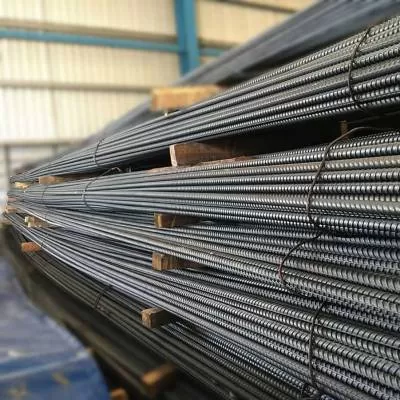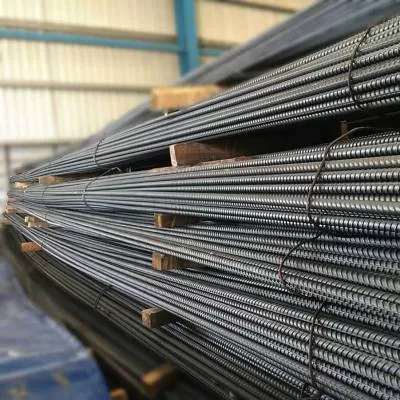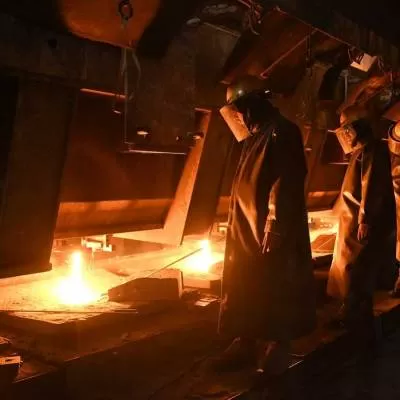- Home
- Building Material
- Steel
- Woes and wishlists

Woes and wishlists
Steel
Chetan Tamboli, Chairman and Managing Director, Steelcast
This year's Budget is likely to address issues related to investments that will fuel economic growth and cut expenditure to improve various deficits. Accordingly, we believe that the Government will focus on cutting subsidies to reduce expenditure. Through price decontrol in petrol and diesel, it is already on its way to cutting fuel subsidies. The Budget is likely to address the issue of fertiliser subsidy through direct cash transfer. Apart from this, the Government will also focus on increasing revenues through indirect and direct taxes and announce policy measures that will increase infrastructure spending. The casting and forging industry lags in technology adaption and energy conservation measures, as most industry units are small-scale in nature. To match the technology and production quality of the developed world, we need better equipment and technical knowhow. We expect the Government to look into this matter and ensure assistance for small-scale industries to adopt the latest technology. This will not only help companies like us in the organised sector but ensure that the product made by small-scale units in India matches world standards. The demand for castings comes from every segment of the infrastructure sector: power plants, shipping, railways and construction, mining and earthmoving equipment. In the past few quarters, domestic demand has taken a beating owing to slowdown in infrastructure spending. If the government increases infra spend, higher growth is possible along with increased employment.
Hemant M Nerurkar, Managing Director, Tata Steel
The consistent fall in the GDP and Index for Industrial Production (IIP) brings the action to fight inflation into perspective. The RBI's refusal to cut interest rates has dampened the economic growth rate, especially affecting the manufacturing sector. With economic activities slowing down, the target fiscal deficit of 5.3 per cent set by the Government also appears to be difficult to achieve on the back of weaker revenues. The rupee has also not performed well against the currency basket. This backdrop and the impending elections in 2014 are likely to be the main influencers for the 2013 Budget. We expect financial easing; encouraging tax cuts to stimulate consumption; further economic reforms; control of inflation with a new normal of inflation around 6.5-7 per cent; and allowance of FDI in other sectors to boost inflow of foreign exchange. The Twelfth Five-Year Plan has built robust growth initiatives for the country. The Government should intervene to ensure that these plans take off in the manner envisaged. Some of these may include kicking off infrastructure projects; establishing agencies to clear projects in various sectors to top priority; setting up a stable petroleum product pricing mechanism including diesel, cooking gas, etc; incentives to the manufacturing sector to boost productivity; reforms in the financial space to boost savings; initiatives to boost infrastructure in rural areas; and review of the progress of projects and intervention to speed them up.
Equipment
Dr V Sumantran, Chairman, Ashok Leyland John Deere Construction Equipment Company
Being the crucial pre-election Budget, the 2013 Budget is expected to be a pragmatic one. In recent times, the Government has begun to show a determination to improve GDP growth through a few major reforms and the Budget is expected to help it move towards targeted growth levels. To entice private and foreign investment in infrastructure, it also needs to announce infrastructure reforms and address the huge infrastructure deficit. On the macro level, the widening fiscal deficit, declining GDP growth rate and rising inflation must be addressed. The Government needs to improve the supply of agricultural produce and other commodities to control stubborn inflation trend in wholesale prices. To reduce fiscal deficit through phased reduction in subsidies, it is taking steps such as the recent announcement of the partial deregulation in diesel prices. In the infrastructure sector, issues that need immediate attention are delays in land acquisition, project clearances and environmental clearances, especially in the mining sector. The Government needs to improve its execution of sanctioned infrastructure projects in roads, power, irrigation, railways and ports. There must be a special focus on the governance of infrastructure projects to facilitate quick approvals and clearances. The recent appointment of the Cabinet Committee on Investment (CCI) is a favourable step in this direction. Also, ensuring stability in government policy along with improvements in the transparency of tender evaluation and awarding of core infrastructure projects is crucial to increasing investor confidence and sustain growth.
Rajiv Sethi, Founder and CEO, Gemini Power Hydraulics
With a drop in GDP and the onset of election year, a weak-minded government might hold tight on infrastructure spend. De-shackling the mining sector is a specific issue that needs to be tackled. We would like the Government to revive investment in power and mining; speed up the land acquisition process for roads; and introduce GST at the soonest.
Wilfried Theissen, Managing Director, Putzmeister Concrete Machines
We expect this Budget to bring some good news for the construction industry. The industry is expecting the announcement of measures that will boost growth. As an equipment supplier, we are directly affected by the trends in the infrastructure and real-estate sector. We are awaiting the announcement of many new projects, especially in the power and roads and bridges sector, as well as an announcement on the uniform tax regime.
Vipin Sondhi, Managing Director and CEO, JCB India
The Budget is expected to be a fine balance between pragmatism and fiscal control to put the economy back on a positive growth track. The Government should enhance both public and private investment. Low interest rates by the RBI would certainly give a fillip to investment and, consequently, growth. From the equipment perspective, the clearance of the upcoming Delhi-Mumbai Industrial Corridor and other projects of national importance should be accelerated; they should be put on fast-track implementation to act as growth enablers. Also, the government should restrict the import of second-hand equipment. A special team should be put in place for inspection and supervision of imported second-hand machinery to ensure safety and compliance. Another issue is the lack of skilled manpower. The National Skill Development Council (NSDC), a first-of-its-kind PPP in India, acts as a catalyst by providing funds to enterprises, companies and organisations to provide skill training. In the same vein, state-level Cabinet Committee on Investment (CCI) must be set up to clear infrastructure projects. The inclusion of earthmoving equipment in the Focus Product Scheme will go a long way in upgrading product quality and bringing in advanced manufacturing skills, boosting the image of India as the engineering hub for the world. Further, the Government should work towards simplification of the tax regime and increasing engagement of industry associations to encourage growth in the construction sector.
Contractors
K Subrahmanian, Managing Director, Afcons Infrastructure
The Indian infrastructure segment is now at a crossroads. We expect the upcoming Budget to kick-start activities on the ground. In terms of infusing capital, the Government can initiate activities through directed spending on infrastructure. The appointment of a nodal agency for all approvals with a time frame and accountability will be an important step. The current domestic credit mechanisms are not amenable for long tenure (15plus years) funding. Specialised credit institutions and other long-term investors (such as pension funds and insurance funds) should be encouraged to invest in infrastructure. Another factor leading to the involvement of new funding mechanisms is current exposure of the domestic banking sector to infrastructure and minimal leeway available for further credit to the sector, particularly power. Developers and construction companies are facing financial stress because of high leverages leading to high interest costs, thus leading to poor profitability, and high working capital requirements. To provide relief and further capital for investment, we need differential interest rates for infrastructure projects as well as time-bound claim and dispute resolution mechanisms. Structural issues, like the slowdown in the power sector must also be addressed with the rationalisation of power tariffs with input cost and efficiency-based structures. Partial privatisation of state electricity boards to enable improved performance can be evaluated. Further, the Government should provide incentives and soft loans for projects in geographies such as Africa, South America, the Middle East and Central Asia, including taxation benefits, deemed export benefits, equipment import and domestic equipment purchase benefits.
Amitabh Mundhra, Vice Chairman, Simplex Infrastructures
Tax collection is likely to decline, leading to a big deficit in the Budget. Availability of funds for infrastructure development will deplete unless the Government invests more money in it. To address these issues, more programmes need to be started including the next phase of infrastructure development. Additionally, more projects in power and power transportation need to be launched. Also, the overall project environment, including coal linkages, needs to be improved.
Real Estate
SK Sayal, Director and CEO, Alpha G:Corp
We expect the Government to give us a growth-oriented budget. The IIP registered a jump in October 2012, performing better than September. While these signs are encouraging, forecasts of slow GDP growth can see the Government taking measures to enhance consumption and bridge the fiscal deficit. It might continue steps to ensure cash flows, such as raising the prices of diesel and LPG and slashing subsidies on petroleum and fertiliser, though the challenge would be to keep inflation under check. We also don't foresee the Government shifting its stance on tax policies introduced last year. From the perspective of real estate, issues like land acquisition and single-window clearance for projects need to be addressed. Another concern is the imposition of service tax on home buyers and sellers, which has an adverse impact on property prices, further hampering buying capacity. This is detrimental to the growth of the realty sector as a whole. Moreover, selling a house is not tantamount to a service as it is a tangible product. Apart from this, recent progressive measures like allowing real-estate developers and housing finance companies to raise up to $1 billion through the external commercial borrowings (ECBs) route will promote affordable housing. The Government must also initiate measures to make the sector more accountable in its functioning, especially in terms of tackling the issue of black money. This will tackle issues like non-transparency and project delivery delays that are detrimental to the growth of the sector.
Real Estate
Neeraj Gulati, Managing Director, Assotech Realty
The priorities before the Government in FY13-14 are no different than previous years, except that the economic situation has become more aggravated, needing more attention. As the second Union Budget of the Twelfth Five-Year Plan, the Government needs to implement infrastructure development and employment generation. Over the years, high inflation has played havoc with millions of poor and low-income families and 2012-13 has ended on a murky note with the widening of the current account deficit, attributable to a rise in gold imports, decline in domestic savings and continuing growth slowdown coupled with high inflation. Fiscal consolidation will have a central place in the forthcoming budget. A marginal rise in the personal tax exemption limit and some readjustment of slabs for higher income groups to raise additional revenue would be appreciated from the government. From a developer's view, we recommend procedural aspects, revenue impacting aspects and other strata that aims to create a positive way forward. Recommending a three-pronged process, the Government should aim to bring in a positive boost to the real-estate sector that has encountered an impediment due to regulatory roadblocks. We seek to gain infrastructure status for the real-estate sector; initiate priority status for affordable housing and slum redevelopment projects with a special residential zone grant for affordable housing; and the promotion of rental housing projects; all of which will help the growth process. Also, long-pending bills on land acquisition and real-estate regulation and development should be passed in 2013 to bring transparency and improve sentiment.
Vishwajeet Jhavar, CEO, Marvel Realtors
Although GDP levels are low, we expect real-estate growth to exceed 5.9 per cent. Realty purchase in India is based on demand, and this certainly exceeds supply. In the ultra luxury segment, availability is less than 1 per cent of the overall real-estate market, considerably less than the 5-6 per cent of the rest of the world. So we believe that we will continue to see a good demand in this segment; this is supported by the successful launches we've had for our past three projects. Also, the real-estate sector's longstanding demand for industry status should be fulfilled. This will ensure cleaner ways of financing for developers at the land-buying stage. Although we are fortunate to have the support of private equity funds at Marvel Realtors, for the rest of the industry, this continues to be a concern, making projects expensive and financing unstable. Currently, the Government is pushing ahead decisions regarding the growth of all industries, including real estate. We hope this will result in an easier process for clearances. Right now, these processes are delaying launch dates and project timelines, which in turn affect project finances and sales.
Rohtas Goel, Chairman and Managing Director, Omaxe
We expect the Budget to focus on the infrastructure sector and other reform measures to arrest the dip in GDP and moderate inflation. The Budget is also expected to focus more on government expenditure to generate demand. Investment in infrastructure will help create a multiplier effect in the economy. Single-window clearance and demand for industry status have been long-pending demands of the real-estate sector. This will facilitate faster project execution and easy financing options at moderate rate of interest. The sector remains the second highest employer, so the need to make it conducive for the overall growth of the economy is imperative. Besides, a lot of the industry is directly or indirectly related to the sector, making it all the more important for it to grow. We expect Budget 2013 to address housing shortage through incentives to developers to take up more affordable housing projects and to end-users by way of tax exemptions. Along with this, friendly land acquisition norms, a considerate real-estate bill and a resolution of issues of service tax, stamp duty and VAT will all combine to help the sector bridge the demand gap. The easing of FDI in retail will have a positive impact on the sector in coming years. Further, fast-tracking of infrastructure projects is the need of the hour as focus on Tier-II and -III cities has become an area of priority for every business.
CementVinita Singhania, Managing Director, JK Lakshmi Cement
The impact of the growth slowdown on the Budget should be seen in the context of high fiscal deficit. The Finance Minister must perform a balancing act to meet conflicting objectives, which will be all the more complicated as this is the last Budget before the general elections. Above all, it should encourage investment in the industry and infrastructure by reducing corporate tax rates, enhance the general rate of depreciation and restore investment allowance. At the same time, to keep the fiscal deficit under check, we need better expenditure management with outcomes taking precedence over outlays. Fiscal and monetary policies need to go hand in hand and the RBI should take steps towards lower interest rates. It is essential to provide stimulus to sectors that are major users of cement. For example, we should encourage cement and concrete technology for roads. It is also important to encourage affordable housing by providing tax incentives. A number of infrastructure companies are backing out of National Highways projects; their concerns must be addressed. The cement sector attracts one of the highest taxation rates amongst industrial products, similar to luxury goods. The excise duty on cement is also higher than other core sector industries such as coal and steel. We hope the Budget provides some relief in terms of a reduction and rationalisation of the excise duty structure. What's more, major inputs for cement manufacturing attract customs duty but the finished product can be imported at zero duty. This anomaly should be removed in the Budget.
Sumit Banerjee, Vice Chairman, Reliance Cement and CEO (Infrastructure), Reliance Infrastructure
This Budget is critical, as it comes at a time when India is witnessing its slowest growth in over a decade, staring at a mounting fiscal deficit, bogged down by inflationary pressure, eroding investor confidence and the upcoming general elections in 2014. We may witness reduced spending on sectors such as exports and defence research and a cut-down in subsidy payments. On the other hand, an increase in spending can be expected in sectors like infrastructure and agriculture. Also, the Government might choose reformist measures to increase revenue receipts through further reduction in fuel subsidies, increase its tax receipts through direct and indirect taxes, and set a higher target for divestments. Reforms, reforms and reforms is the mantra for the economic growth. Issues that plague investor sentiment need to be addressed on a war footing and investment-conducive policies fast-tracked into implementation to make India a preferred market for global investments. From the infrastructure and construction standpoint, the Government must recognise the urgency of the projects at hand and facilitate an environment where projects can be implemented with stipulated time, cost and quality. Some expectations from the Government are passage of the land acquisition bill; effective operationalisation of the Cabinet Committee on Investment (CCI); implementation of Goods and Service Tax (GST); continuation of 80IA tax benefits for critical infrastructure projects; creation of innovative financing options for long-gestation infrastructure projects; and further liberalisation of ECB borrowing norms and limits. Other policy reforms include mining leases and FDI in specific sectors.
Alok Sanghi, Director, Sanghi Industries
The intention of the Finance Minister to reduce the budget deficit is very clear. This is possible only by increasing revenue and can only be done by the industry. For this, the Finance Minister is bound to increase indirect taxes and cut subsidies. So, we don't expect any cut in indirect taxes as far as industry is concerned. The Budget may also look at offering policy guidelines on the direct tax code and goods and services tax roadmap. The prime issue for the cement industry is high taxation. In the form of royalty, MAT and other taxes, cement is amongst the highest taxed of all industries. Considering the fact that cement is inevitable for any infrastructure spending, it can easily be called an essential commodity though the Government is yet to classify it under that category. In the past couple of years, economic growth has faltered owing to high interest rates, falling demand and low infrastructure spend by the Government. We believe the best way to revive this growth is through increasing infrastructure spend. The Government must find a way to generate demand; maximum employment generation comes through infrastructure spending and not the services sector. At present, investment is stuck owing to policy matters. Here, the Government can intervene and ensure that the Budget addresses this issue. This will not only help the cement sector but enable growth and employment generation in other sectors.
Abhijit Roy, Managing Director, Berger Paints
The reduction in GDP from 8 per cent to 5.7 per cent will result in a reduction of earnings for the Government. Expenses are committed and cannot be brought down. This will pressurise the Government to raise revenues. Diesel price increase, partial withdrawal of gas subsidies and increase of rail fares are all moving in this direction. Widening of the tax base and marginal increase in tax rates are anticipated. This will put pressure on the common man's finances and reduce spending. Controlling high inflation, reining in deficits by curtailing non-essential expenses and kick-starting demand should be the key tasks for this Budget. In terms of the paints sector, the Government had lowered the import duty on TiO2 last year but it was allowed under a chapter, wherein a negligible quantity is imported by manufacturers. This anomaly needs to be corrected in this Budget. Also, there should be tax breaks for energy-saving products like EIFS supplied by the paint industry, as done abroad.
Others
M Murali, Director General, National Highways Builders Federation
The focus of this year's Budget should be on domestic demand-driven growth recovery, revival of high growth in private investment, addressing supply bottlenecks in the agriculture, energy and transport sectors, and tackling problems of malnutrition, while implementing decisions to improve delivery systems, governance and transparency. The Government must recognise the construction industry as a labour-intensive industry and offer it regulatory or financial incentives. It should also facilitate training in technical manpower; work towards reforms and rationalisation in the regulatory and financial framework of PPPs; rationalise the treatment of SPVs; and exempt infrastructure holding companies from the restrictions imposed on non-banking financial companies (NBFCs). Speedy urbanisation will require concrete policies for road infrastructure development with crucial decisions on taxation and bank lending structure. We would like special funds for urban infrastructure development, including metro rail projects, road building, comprehensive water management and sewage treatment plants. Ambiguities in taxation policies, land acquisition policy, environmental clearances and state support agreements need to be addressed. As road builders are already under huge financial pressure owing to inflation, there should be no price hikes on building materials like steel, cement and bitumen. In short, our expectations include a major boost for the infrastructure segment, especially road development; rationalisation of the taxation system; widening of the scope of PPP for road development projects; easy and liberal financial policy support for road financing; restructuring of completed road projects by allowing the exit option; and focus on implementation in order to achieve projected growth.
Building Materials
Gautam Chand Jain, Chairman and Managing Director, Pokarna
The Government should give some sops for better growth. It should launch new development schemes without tampering with the current taxation structure. Similarly, a thrust on infrastructure development is needed. Issues such land acquisitions, government approvals and fuel linkages need to be addressed. Andhra Pradesh faces a major problem of power supply. The Government needs to look into this and ensure us adequate power at reasonable prices.
Amit Maitra, Managing Director, Lerch Bates
This pre-election year Budget is expected to be 'soft' with no major negative tax changes or introductions. Measures will need to be directed towards growth and reducing and containing the fiscal deficit. The Budget needs to provide the required stimulus to kick-start the economy and put it on a high growth trajectory as experienced some years ago. For the fiscal deficit, reforms and subsidy reduction are needed as well as other measures like reduction in taxation and bringing more people into the tax net, creating a larger and wider tax base. Leakages of public funds given as subsidies need to be contained and eliminated. Infrastructure development is very slow and needs to be put on a fast track. Without this, GDP growth will lag. Interest rate reduction is a must to stimulate purchases as property rates must become more affordable. They are too high now, particularly in urban areas. Public-private partnership funding needs to be taken to the next level so that projects can swiftly move ahead. Further, statutory clearance processes must be made swifter and more user-friendly. Land reforms are a critical need to spur infrastructure development and growth. To summarise, the Government must support the growth of infrastructure and real estate in urban development aimed at GDP growth.
The GDP is expected to stay at around 5.7-5.9 per cent for this financial year - its lowest level since 2002 - as against the predicted 8 per cent mark. We asked key stakeholders and consultants involved with the construction, infrastructure, real-estate and building material industries, how this will affect this year's Budget, and share with us their own expectations and recommendations. Here's what they told CW... Steel Chetan Tamboli, Chairman and Managing Director, Steelcast This year's Budget is likely to address issues related to investments that will fuel economic growth and cut expenditure to improve various deficits. Accordingly, we believe that the Government will focus on cutting subsidies to reduce expenditure. Through price decontrol in petrol and diesel, it is already on its way to cutting fuel subsidies. The Budget is likely to address the issue of fertiliser subsidy through direct cash transfer. Apart from this, the Government will also focus on increasing revenues through indirect and direct taxes and announce policy measures that will increase infrastructure spending. The casting and forging industry lags in technology adaption and energy conservation measures, as most industry units are small-scale in nature. To match the technology and production quality of the developed world, we need better equipment and technical knowhow. We expect the Government to look into this matter and ensure assistance for small-scale industries to adopt the latest technology. This will not only help companies like us in the organised sector but ensure that the product made by small-scale units in India matches world standards. The demand for castings comes from every segment of the infrastructure sector: power plants, shipping, railways and construction, mining and earthmoving equipment. In the past few quarters, domestic demand has taken a beating owing to slowdown in infrastructure spending. If the government increases infra spend, higher growth is possible along with increased employment. Hemant M Nerurkar, Managing Director, Tata Steel The consistent fall in the GDP and Index for Industrial Production (IIP) brings the action to fight inflation into perspective. The RBI's refusal to cut interest rates has dampened the economic growth rate, especially affecting the manufacturing sector. With economic activities slowing down, the target fiscal deficit of 5.3 per cent set by the Government also appears to be difficult to achieve on the back of weaker revenues. The rupee has also not performed well against the currency basket. This backdrop and the impending elections in 2014 are likely to be the main influencers for the 2013 Budget. We expect financial easing; encouraging tax cuts to stimulate consumption; further economic reforms; control of inflation with a new normal of inflation around 6.5-7 per cent; and allowance of FDI in other sectors to boost inflow of foreign exchange. The Twelfth Five-Year Plan has built robust growth initiatives for the country. The Government should intervene to ensure that these plans take off in the manner envisaged. Some of these may include kicking off infrastructure projects; establishing agencies to clear projects in various sectors to top priority; setting up a stable petroleum product pricing mechanism including diesel, cooking gas, etc; incentives to the manufacturing sector to boost productivity; reforms in the financial space to boost savings; initiatives to boost infrastructure in rural areas; and review of the progress of projects and intervention to speed them up. Equipment Dr V Sumantran, Chairman, Ashok Leyland John Deere Construction Equipment Company Being the crucial pre-election Budget, the 2013 Budget is expected to be a pragmatic one. In recent times, the Government has begun to show a determination to improve GDP growth through a few major reforms and the Budget is expected to help it move towards targeted growth levels. To entice private and foreign investment in infrastructure, it also needs to announce infrastructure reforms and address the huge infrastructure deficit. On the macro level, the widening fiscal deficit, declining GDP growth rate and rising inflation must be addressed. The Government needs to improve the supply of agricultural produce and other commodities to control stubborn inflation trend in wholesale prices. To reduce fiscal deficit through phased reduction in subsidies, it is taking steps such as the recent announcement of the partial deregulation in diesel prices. In the infrastructure sector, issues that need immediate attention are delays in land acquisition, project clearances and environmental clearances, especially in the mining sector. The Government needs to improve its execution of sanctioned infrastructure projects in roads, power, irrigation, railways and ports. There must be a special focus on the governance of infrastructure projects to facilitate quick approvals and clearances. The recent appointment of the Cabinet Committee on Investment (CCI) is a favourable step in this direction. Also, ensuring stability in government policy along with improvements in the transparency of tender evaluation and awarding of core infrastructure projects is crucial to increasing investor confidence and sustain growth. Rajiv Sethi, Founder and CEO, Gemini Power Hydraulics With a drop in GDP and the onset of election year, a weak-minded government might hold tight on infrastructure spend. De-shackling the mining sector is a specific issue that needs to be tackled. We would like the Government to revive investment in power and mining; speed up the land acquisition process for roads; and introduce GST at the soonest. Wilfried Theissen, Managing Director, Putzmeister Concrete Machines We expect this Budget to bring some good news for the construction industry. The industry is expecting the announcement of measures that will boost growth. As an equipment supplier, we are directly affected by the trends in the infrastructure and real-estate sector. We are awaiting the announcement of many new projects, especially in the power and roads and bridges sector, as well as an announcement on the uniform tax regime. Vipin Sondhi, Managing Director and CEO, JCB India The Budget is expected to be a fine balance between pragmatism and fiscal control to put the economy back on a positive growth track. The Government should enhance both public and private investment. Low interest rates by the RBI would certainly give a fillip to investment and, consequently, growth. From the equipment perspective, the clearance of the upcoming Delhi-Mumbai Industrial Corridor and other projects of national importance should be accelerated; they should be put on fast-track implementation to act as growth enablers. Also, the government should restrict the import of second-hand equipment. A special team should be put in place for inspection and supervision of imported second-hand machinery to ensure safety and compliance. Another issue is the lack of skilled manpower. The National Skill Development Council (NSDC), a first-of-its-kind PPP in India, acts as a catalyst by providing funds to enterprises, companies and organisations to provide skill training. In the same vein, state-level Cabinet Committee on Investment (CCI) must be set up to clear infrastructure projects. The inclusion of earthmoving equipment in the Focus Product Scheme will go a long way in upgrading product quality and bringing in advanced manufacturing skills, boosting the image of India as the engineering hub for the world. Further, the Government should work towards simplification of the tax regime and increasing engagement of industry associations to encourage growth in the construction sector. Contractors K Subrahmanian, Managing Director, Afcons Infrastructure The Indian infrastructure segment is now at a crossroads. We expect the upcoming Budget to kick-start activities on the ground. In terms of infusing capital, the Government can initiate activities through directed spending on infrastructure. The appointment of a nodal agency for all approvals with a time frame and accountability will be an important step. The current domestic credit mechanisms are not amenable for long tenure (15plus years) funding. Specialised credit institutions and other long-term investors (such as pension funds and insurance funds) should be encouraged to invest in infrastructure. Another factor leading to the involvement of new funding mechanisms is current exposure of the domestic banking sector to infrastructure and minimal leeway available for further credit to the sector, particularly power. Developers and construction companies are facing financial stress because of high leverages leading to high interest costs, thus leading to poor profitability, and high working capital requirements. To provide relief and further capital for investment, we need differential interest rates for infrastructure projects as well as time-bound claim and dispute resolution mechanisms. Structural issues, like the slowdown in the power sector must also be addressed with the rationalisation of power tariffs with input cost and efficiency-based structures. Partial privatisation of state electricity boards to enable improved performance can be evaluated. Further, the Government should provide incentives and soft loans for projects in geographies such as Africa, South America, the Middle East and Central Asia, including taxation benefits, deemed export benefits, equipment import and domestic equipment purchase benefits. Amitabh Mundhra, Vice Chairman, Simplex Infrastructures Tax collection is likely to decline, leading to a big deficit in the Budget. Availability of funds for infrastructure development will deplete unless the Government invests more money in it. To address these issues, more programmes need to be started including the next phase of infrastructure development. Additionally, more projects in power and power transportation need to be launched. Also, the overall project environment, including coal linkages, needs to be improved. Real Estate SK Sayal, Director and CEO, Alpha G:Corp We expect the Government to give us a growth-oriented budget. The IIP registered a jump in October 2012, performing better than September. While these signs are encouraging, forecasts of slow GDP growth can see the Government taking measures to enhance consumption and bridge the fiscal deficit. It might continue steps to ensure cash flows, such as raising the prices of diesel and LPG and slashing subsidies on petroleum and fertiliser, though the challenge would be to keep inflation under check. We also don't foresee the Government shifting its stance on tax policies introduced last year. From the perspective of real estate, issues like land acquisition and single-window clearance for projects need to be addressed. Another concern is the imposition of service tax on home buyers and sellers, which has an adverse impact on property prices, further hampering buying capacity. This is detrimental to the growth of the realty sector as a whole. Moreover, selling a house is not tantamount to a service as it is a tangible product. Apart from this, recent progressive measures like allowing real-estate developers and housing finance companies to raise up to $1 billion through the external commercial borrowings (ECBs) route will promote affordable housing. The Government must also initiate measures to make the sector more accountable in its functioning, especially in terms of tackling the issue of black money. This will tackle issues like non-transparency and project delivery delays that are detrimental to the growth of the sector. Real Estate Neeraj Gulati, Managing Director, Assotech Realty The priorities before the Government in FY13-14 are no different than previous years, except that the economic situation has become more aggravated, needing more attention. As the second Union Budget of the Twelfth Five-Year Plan, the Government needs to implement infrastructure development and employment generation. Over the years, high inflation has played havoc with millions of poor and low-income families and 2012-13 has ended on a murky note with the widening of the current account deficit, attributable to a rise in gold imports, decline in domestic savings and continuing growth slowdown coupled with high inflation. Fiscal consolidation will have a central place in the forthcoming budget. A marginal rise in the personal tax exemption limit and some readjustment of slabs for higher income groups to raise additional revenue would be appreciated from the government. From a developer's view, we recommend procedural aspects, revenue impacting aspects and other strata that aims to create a positive way forward. Recommending a three-pronged process, the Government should aim to bring in a positive boost to the real-estate sector that has encountered an impediment due to regulatory roadblocks. We seek to gain infrastructure status for the real-estate sector; initiate priority status for affordable housing and slum redevelopment projects with a special residential zone grant for affordable housing; and the promotion of rental housing projects; all of which will help the growth process. Also, long-pending bills on land acquisition and real-estate regulation and development should be passed in 2013 to bring transparency and improve sentiment. Vishwajeet Jhavar, CEO, Marvel Realtors Although GDP levels are low, we expect real-estate growth to exceed 5.9 per cent. Realty purchase in India is based on demand, and this certainly exceeds supply. In the ultra luxury segment, availability is less than 1 per cent of the overall real-estate market, considerably less than the 5-6 per cent of the rest of the world. So we believe that we will continue to see a good demand in this segment; this is supported by the successful launches we've had for our past three projects. Also, the real-estate sector's longstanding demand for industry status should be fulfilled. This will ensure cleaner ways of financing for developers at the land-buying stage. Although we are fortunate to have the support of private equity funds at Marvel Realtors, for the rest of the industry, this continues to be a concern, making projects expensive and financing unstable. Currently, the Government is pushing ahead decisions regarding the growth of all industries, including real estate. We hope this will result in an easier process for clearances. Right now, these processes are delaying launch dates and project timelines, which in turn affect project finances and sales. Rohtas Goel, Chairman and Managing Director, Omaxe We expect the Budget to focus on the infrastructure sector and other reform measures to arrest the dip in GDP and moderate inflation. The Budget is also expected to focus more on government expenditure to generate demand. Investment in infrastructure will help create a multiplier effect in the economy. Single-window clearance and demand for industry status have been long-pending demands of the real-estate sector. This will facilitate faster project execution and easy financing options at moderate rate of interest. The sector remains the second highest employer, so the need to make it conducive for the overall growth of the economy is imperative. Besides, a lot of the industry is directly or indirectly related to the sector, making it all the more important for it to grow. We expect Budget 2013 to address housing shortage through incentives to developers to take up more affordable housing projects and to end-users by way of tax exemptions. Along with this, friendly land acquisition norms, a considerate real-estate bill and a resolution of issues of service tax, stamp duty and VAT will all combine to help the sector bridge the demand gap. The easing of FDI in retail will have a positive impact on the sector in coming years. Further, fast-tracking of infrastructure projects is the need of the hour as focus on Tier-II and -III cities has become an area of priority for every business.Cement Vinita Singhania, Managing Director, JK Lakshmi Cement The impact of the growth slowdown on the Budget should be seen in the context of high fiscal deficit. The Finance Minister must perform a balancing act to meet conflicting objectives, which will be all the more complicated as this is the last Budget before the general elections. Above all, it should encourage investment in the industry and infrastructure by reducing corporate tax rates, enhance the general rate of depreciation and restore investment allowance. At the same time, to keep the fiscal deficit under check, we need better expenditure management with outcomes taking precedence over outlays. Fiscal and monetary policies need to go hand in hand and the RBI should take steps towards lower interest rates. It is essential to provide stimulus to sectors that are major users of cement. For example, we should encourage cement and concrete technology for roads. It is also important to encourage affordable housing by providing tax incentives. A number of infrastructure companies are backing out of National Highways projects; their concerns must be addressed. The cement sector attracts one of the highest taxation rates amongst industrial products, similar to luxury goods. The excise duty on cement is also higher than other core sector industries such as coal and steel. We hope the Budget provides some relief in terms of a reduction and rationalisation of the excise duty structure. What's more, major inputs for cement manufacturing attract customs duty but the finished product can be imported at zero duty. This anomaly should be removed in the Budget. Sumit Banerjee, Vice Chairman, Reliance Cement and CEO (Infrastructure), Reliance Infrastructure This Budget is critical, as it comes at a time when India is witnessing its slowest growth in over a decade, staring at a mounting fiscal deficit, bogged down by inflationary pressure, eroding investor confidence and the upcoming general elections in 2014. We may witness reduced spending on sectors such as exports and defence research and a cut-down in subsidy payments. On the other hand, an increase in spending can be expected in sectors like infrastructure and agriculture. Also, the Government might choose reformist measures to increase revenue receipts through further reduction in fuel subsidies, increase its tax receipts through direct and indirect taxes, and set a higher target for divestments. Reforms, reforms and reforms is the mantra for the economic growth. Issues that plague investor sentiment need to be addressed on a war footing and investment-conducive policies fast-tracked into implementation to make India a preferred market for global investments. From the infrastructure and construction standpoint, the Government must recognise the urgency of the projects at hand and facilitate an environment where projects can be implemented with stipulated time, cost and quality. Some expectations from the Government are passage of the land acquisition bill; effective operationalisation of the Cabinet Committee on Investment (CCI); implementation of Goods and Service Tax (GST); continuation of 80IA tax benefits for critical infrastructure projects; creation of innovative financing options for long-gestation infrastructure projects; and further liberalisation of ECB borrowing norms and limits. Other policy reforms include mining leases and FDI in specific sectors. Alok Sanghi, Director, Sanghi Industries The intention of the Finance Minister to reduce the budget deficit is very clear. This is possible only by increasing revenue and can only be done by the industry. For this, the Finance Minister is bound to increase indirect taxes and cut subsidies. So, we don't expect any cut in indirect taxes as far as industry is concerned. The Budget may also look at offering policy guidelines on the direct tax code and goods and services tax roadmap. The prime issue for the cement industry is high taxation. In the form of royalty, MAT and other taxes, cement is amongst the highest taxed of all industries. Considering the fact that cement is inevitable for any infrastructure spending, it can easily be called an essential commodity though the Government is yet to classify it under that category. In the past couple of years, economic growth has faltered owing to high interest rates, falling demand and low infrastructure spend by the Government. We believe the best way to revive this growth is through increasing infrastructure spend. The Government must find a way to generate demand; maximum employment generation comes through infrastructure spending and not the services sector. At present, investment is stuck owing to policy matters. Here, the Government can intervene and ensure that the Budget addresses this issue. This will not only help the cement sector but enable growth and employment generation in other sectors. Abhijit Roy, Managing Director, Berger Paints The reduction in GDP from 8 per cent to 5.7 per cent will result in a reduction of earnings for the Government. Expenses are committed and cannot be brought down. This will pressurise the Government to raise revenues. Diesel price increase, partial withdrawal of gas subsidies and increase of rail fares are all moving in this direction. Widening of the tax base and marginal increase in tax rates are anticipated. This will put pressure on the common man's finances and reduce spending. Controlling high inflation, reining in deficits by curtailing non-essential expenses and kick-starting demand should be the key tasks for this Budget. In terms of the paints sector, the Government had lowered the import duty on TiO2 last year but it was allowed under a chapter, wherein a negligible quantity is imported by manufacturers. This anomaly needs to be corrected in this Budget. Also, there should be tax breaks for energy-saving products like EIFS supplied by the paint industry, as done abroad. Others M Murali, Director General, National Highways Builders Federation The focus of this year's Budget should be on domestic demand-driven growth recovery, revival of high growth in private investment, addressing supply bottlenecks in the agriculture, energy and transport sectors, and tackling problems of malnutrition, while implementing decisions to improve delivery systems, governance and transparency. The Government must recognise the construction industry as a labour-intensive industry and offer it regulatory or financial incentives. It should also facilitate training in technical manpower; work towards reforms and rationalisation in the regulatory and financial framework of PPPs; rationalise the treatment of SPVs; and exempt infrastructure holding companies from the restrictions imposed on non-banking financial companies (NBFCs). Speedy urbanisation will require concrete policies for road infrastructure development with crucial decisions on taxation and bank lending structure. We would like special funds for urban infrastructure development, including metro rail projects, road building, comprehensive water management and sewage treatment plants. Ambiguities in taxation policies, land acquisition policy, environmental clearances and state support agreements need to be addressed. As road builders are already under huge financial pressure owing to inflation, there should be no price hikes on building materials like steel, cement and bitumen. In short, our expectations include a major boost for the infrastructure segment, especially road development; rationalisation of the taxation system; widening of the scope of PPP for road development projects; easy and liberal financial policy support for road financing; restructuring of completed road projects by allowing the exit option; and focus on implementation in order to achieve projected growth. Building Materials Gautam Chand Jain, Chairman and Managing Director, Pokarna The Government should give some sops for better growth. It should launch new development schemes without tampering with the current taxation structure. Similarly, a thrust on infrastructure development is needed. Issues such land acquisitions, government approvals and fuel linkages need to be addressed. Andhra Pradesh faces a major problem of power supply. The Government needs to look into this and ensure us adequate power at reasonable prices. Amit Maitra, Managing Director, Lerch Bates This pre-election year Budget is expected to be 'soft' with no major negative tax changes or introductions. Measures will need to be directed towards growth and reducing and containing the fiscal deficit. The Budget needs to provide the required stimulus to kick-start the economy and put it on a high growth trajectory as experienced some years ago. For the fiscal deficit, reforms and subsidy reduction are needed as well as other measures like reduction in taxation and bringing more people into the tax net, creating a larger and wider tax base. Leakages of public funds given as subsidies need to be contained and eliminated. Infrastructure development is very slow and needs to be put on a fast track. Without this, GDP growth will lag. Interest rate reduction is a must to stimulate purchases as property rates must become more affordable. They are too high now, particularly in urban areas. Public-private partnership funding needs to be taken to the next level so that projects can swiftly move ahead. Further, statutory clearance processes must be made swifter and more user-friendly. Land reforms are a critical need to spur infrastructure development and growth. To summarise, the Government must support the growth of infrastructure and real estate in urban development aimed at GDP growth.
























